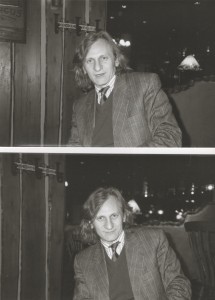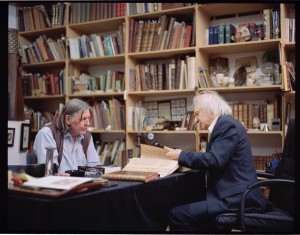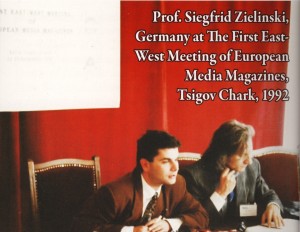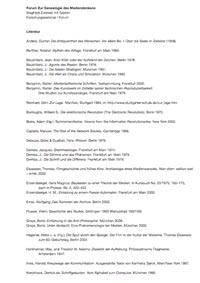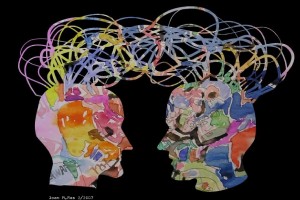“Like heaven and hell, the Internet knows no locality. Body and mind together, on the other hand, can only be present in one place. To prevent further sacralization of the internet, it is useful to develop a profane relationship to them. This can only be done from a place that is outside the networks. Localities have a different quality of public than marketplaces, concert halls, or stadiums.”
(Zielinski, [... After the Media] – News from the Slowly Outfading 20th Century
(Univocal/Minnesota University Press, 2013)
*
***
On the Energies of Dreaming (Forward)
Interview with Dominic Smith, University of Dundee, 2025
https://energy-philosophy.ac.uk/siegfried-zielinski-on-the-energies-of-dreaming/
*
***
https://www.pagina12.com.ar/856223-una-vela-encendida-en-las-pantallas-del-mundo
*
***
*
https://open.spotify.com/episode/4mOJrlDUQL9w1UY06ZQQxh
Lukas Feireiss and Florian Hadler in conversation with Siegfried Zielinski
“über Anarchäologien, Zeitmaschinen und Extelligenzen” (German).
***
*
Fotos: Errki Huhtamo (February 1991, Turku/Finland) during an early conference on MEDIA ARCHAEOLOGY.
Also participating: THOMAS ELSAESSER and WERNER NEKES.
*
***
In Werner Nekes’ Wunderkammer – one of our last conversations about the deep time of technical images, our diverse an-archaeologies of media and the delights and hardships of passionate collecting. Photo (Copyright): MONO KROM, 2014
*
***
*
Friedrich Knilli, charismatic pioneer of critical media research in Germany and founder of the first academic course for media studies at a German university died on February 1, 2022, just a few days before his 92nd birthday, in Berlin.
Siegfried Zielinski zum Tod des Medientheoretikers Friedrich Knilli (deutschlandfunk.de)
***
Radio Kebab
„”We feel as if we are locked in a vacuum, no reaction to our screaming and whispering, our dancing and our music, no echo…….. Dryly our voices bounce off the concrete walls.” – “Wir kommen uns vor als seien wir in ein Vakuum gesperrt, keine Reaktion auf unser Schreien und Flüstern, unsere Tänze und unsere Musik, kein Echo……. Trocken prallen unsere Stimmen von den Betonwänden ab.“ (Radio Kebab was a pirate radio station in Westberlin, distr. Rhizom bookshop, appr. 1980)
***
https://www.rcin.org.pl/dlibra/publication/79482/edition/59835/content?ref=struct
Interview mit Konstantin Sydlowski
“Arqueología prospectiva”
Article in Spanish language in
H-ART. Revista de historia, teoría y crítica de arte
University Los Andes, Bogota, Columbia,
with an introduction by Andrès Burbano:
“Passing the future through the eye of a needle”
https://revistas.uniandes.edu.co/toc/hart/8
*****
“Heiße Spulen im Seminarraum” and
“Schokolade für einen guten Schnitt”
Two Video-Interviews (in German) with ArneKaiser / Generation Testbild
on the Archaeology of Videorecording:
https://www.youtube.com/watch?v=HoXYap2aLAY
https://www.youtube.com/watch?v=nSrNkVaZpPk&feature=youtu.be
*****
Conference near Sofia 1992 (left: Rossen Milew, right: Siegfried Zielinski)
with participants from Albania, Bulgaria, France, Greece, Macedonia, Russia, Hungaria and other countries
*****
PAN Ji, LI Lingyan:
Media Research, Technological Innovation and Knowledge Production:
Insights from Media Archeology—
A Conversation with Professor Siegrfied Zielinski
Published in: Chinese Journal of Journalism & Communication, July 2020
*****
Friedrich Knilli, founder of academic media studies in Berlin, is 90! – (only in German)
*****
Bibliography on Thinking Media
***
Excerpts from the conference program
with Thomas Elsaesser in Beijing, Dec 2019:
北京大学“黉门对话”专家主题论坛
媒介考古:艺术、媒介与感知
Media Archaeology: Art, Media and Perception
议程
Time: Dec. 2-3, 2019
Venue: Yingjie Overseas Exchange Center, Peking University
Convener: Hongfeng Tang (Researcher, School of Arts, Peking University)
Agenda
Dec. 2, 2019
Venue: Moonlight Hall, Yingjie Overseas Exchange Center Host: Hongfeng Tang
I. Opening Ceremony (8:40-9:00)
1. Hongfeng Tang:
Introduction of Conference Theme
2. Feng Peng (Professor and Dean of School of Arts, Peking University) Welcome Speech
II. Keynote Speech (9:00-12:00)
1. Siegfried Zielinski (Professor for Archaeology & Variantology of the Arts & Media at Berlin University of Arts (i.r.) Michel-Foucault-Professor at EGS Saas Fee (CH))(9:00-10:30)
Prospective Archaeologies – Travelling through DEEP TIME OF THE MEDIA – from the Past into the Future
2. Screening (10:45-11:45)
Siegfried Zielinski: Returning to the Future
One Hundred — Twenty Short Films on the Archaeology of Audiovision
3. Q & A (11:45-12:15)
III. Keynote Speech (13:30-15:00)
Thomas Elsaesser (Professor Emeritus, University of Amsterdam) (13:30-15:00)
Film History as Media Archaeology
IV. Conversation (15:10-17:40)
1. Convesation between Prof. Zielinski and Prof. Elsaesser (15:10-16:10)
2. Discussions and Responses (16:10-17:10)
Feng Peng, Huimin Jin, Weixng Chen, Yang Li, Bingfeng Dong (Researcher, School of Intermedia Art, China Academy of Art), Hongzhe Wang, Chang Shi, Yaping Xu
3. Q & A (17:10-17:40)
***
Siegfried Zielinski – Against psychopathia medialis — For normal schizophrenia (Spanish Translation, Trans. Giancarlo Sandoval
*****
KAABA by Aidan Salakhova in the virtual Museum of collector Lutz Teutloff:
https://vimeo.com/143768216
Teutloff Museum’s virtual exhibition of Aidan Salakhova’s video installation ‘Kaaba’, with additional pilosophical comments by Prof. Dr. Siegfried Zielinski ( professor of media theory at the Berlin University of the Arts and member of the Academy of Arts in Berlin), who has a Christian background.
How do you assess the role of Muslim women in Islam?
Neither Christianity nor Islam define a standardised apportionment of roles for women. Word-based religions are interpretations of master-texts, of a Holy Sripture. In Christianity it’s the Bible and in Islam it’s the Qur’an.
Since Muhammad’s time different images of women have been created and established. Today many different ideas compete for women’s favours, which I welcome. The most beautiful and most powerful identities have a message to win.
Is it possible to reform this role internally?
There is no ‘Internal’ in a globalized network. Today and in the future no one can act in complete isolation.
The inner and the outer world of states or religions are inextricably linked. Islam, like Christianity are urgently in need of change. Future is our space of possibilities, we should all be getting actively involved in.
How could this reform be taking place?
Open dialogues are the ways to improve future of religions, anything else will fail. A good dialogue requires participants who can convince with confidence with will to listen. Dialogue and violence are mutually exclusive terms.

